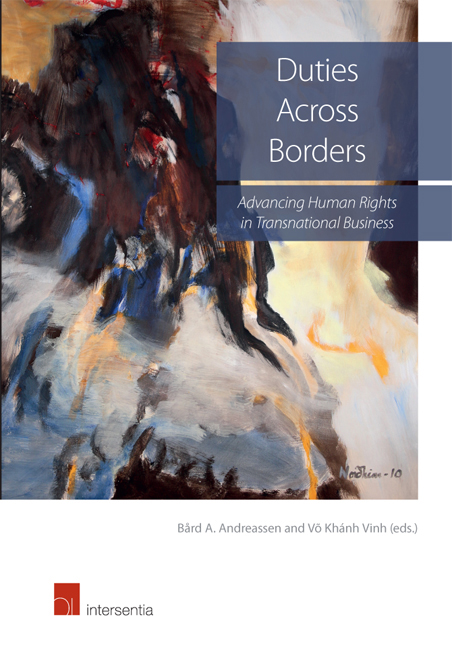Book contents
- Frontmatter
- Preface
- Contents
- List of Authors
- List of Figures and Tables
- Introduction. Business’ Duties Across Borders: The New Human Rights Frontier
- Part I. Conceptual Developments
- Part II Contextual Issues
- Chapter 7 The Next Generation of ‘Fair Trade’. A Human Rights Framework for Combating Corporate Corruption in Global Supply Chains
- Chapter 8 A Critical Analysis of Human Rights Due Diligence Frameworks for Conflict Minerals. Challenges for the Electronics Industries
- Chapter 9 The Pursuit of Substantive Corporate Human Rights Policies
- Part III Sites Of Regulation
Chapter 7 - The Next Generation of ‘Fair Trade’. A Human Rights Framework for Combating Corporate Corruption in Global Supply Chains
from Part II - Contextual Issues
Published online by Cambridge University Press: 21 September 2018
- Frontmatter
- Preface
- Contents
- List of Authors
- List of Figures and Tables
- Introduction. Business’ Duties Across Borders: The New Human Rights Frontier
- Part I. Conceptual Developments
- Part II Contextual Issues
- Chapter 7 The Next Generation of ‘Fair Trade’. A Human Rights Framework for Combating Corporate Corruption in Global Supply Chains
- Chapter 8 A Critical Analysis of Human Rights Due Diligence Frameworks for Conflict Minerals. Challenges for the Electronics Industries
- Chapter 9 The Pursuit of Substantive Corporate Human Rights Policies
- Part III Sites Of Regulation
Summary
INTRODUCTION
From Nike to Coca-Cola to Apple, the emergence of the corporate social responsibility (CSR) movement has led to the recognition of a duty on the part of multinational corporations (MNCs) to work to prevent and remedy human rights violations committed by their foreign subsidiaries and suppliers, regardless of where in the world the violations occur. The international community must now strengthen and utilise the momentum of the CSR movement and apply such a human rights framework to the problem of corruption in global supply chains.
On the heels of more than a decade of calls for the recognition of a human right to live free of corruption, United States President Barack Obama lent legitimacy to the concept when he referred to pervasive corruption as a ‘violation of basic human rights’ in 2010. In the years preceding and since, a fair amount has been written about whether such a right exists and if so whether it could be deemed to bind corporations such that any causes of action arising there from could be adjudicated in an international or domestic court of law.
This chapter accepts the prevailing view that international human rights protections generally do not bind corporations as a matter of hard law (with some notable exceptions). However, it also maintains that there is effectively an indirect, derived right to live in a corruption-free society, resulting from the relationship between corruption and human rights violations, i.e. systemic corruption frequently leads to and may cause violations of human rights. It further maintains that this right applies to corporations under John Ruggie's ‘Protect, Respect and Remedy’ framework (hereafter the Ruggie Framework or the Framework) and therefore must be incorporated into corporations’ CSR policies and internal compliance.
While dispute remains as to whether corruption itself constitutes a human rights violation, it is certainly the prevailing view that systemic corruption entails and precipitates human rights violations. It follows that in order for companies to comply with their duty to respect human rights under the Ruggie Framework, those companies must prevent corruption from occurring within their supply chains. It is not possible to respect human rights without preventing corruption; therefore companies cannot be said to sufficiently respect human rights in their supply chains without making affirmative efforts to prevent corruption therein.
- Type
- Chapter
- Information
- Duties Across BordersAdvancing Human Rights in Transnational Business, pp. 157 - 182Publisher: IntersentiaPrint publication year: 2016

